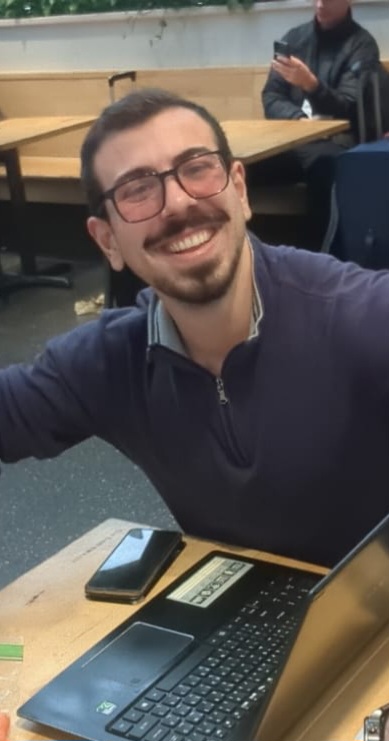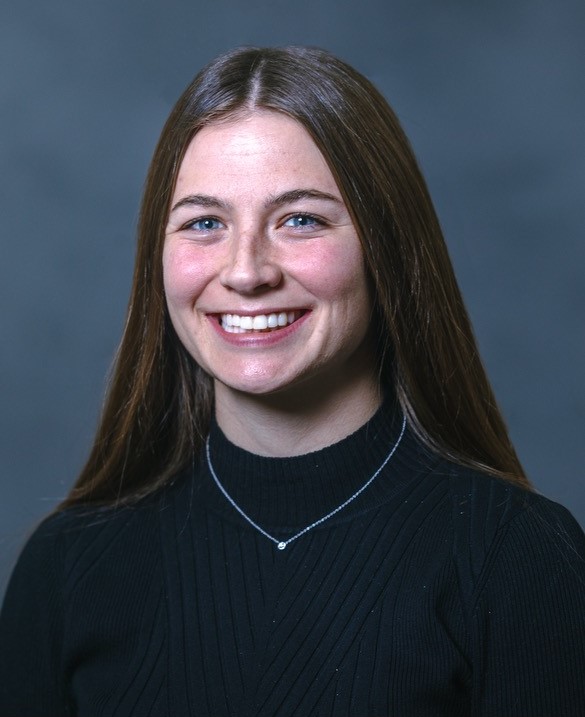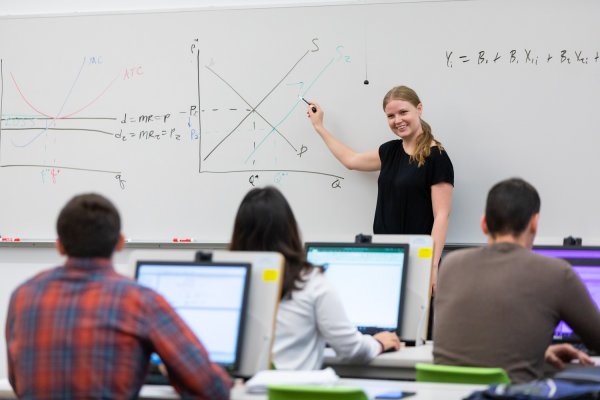Alumni Stories
BACHELORS IN ECONOMICS

Michael Hazboun 23’
1. What have you been doing since you graduated from Valparaiso University?
I’ve been pursuing my doctorate degree in Industrial-Organization (I-O) Psychology, at the University of Minnesota- Twin Cities
2. How has your experience in the Economics department at Valparaiso University helped you to navigate your post-graduation academic or professional career?
My economics background from Valpo has definitely aided, so far, in my academic journey. For starter, my quantitative background has definitely helped me during my time in graduate school, be it in helping me pick up new skills or concepts relatively quickly, or simply knowing more than my peers; it has definitely aided me! Furthermore, being the economics department TA definitely helped me be a better instructor/teacher in the classes that I teach now.
3. What Econ courses that you took as an undergrad were/are valuable during your time at VU and beyond?
Learning and improving my SAS skills in Econometrics has definitely been useful. Funnily enough, a couple of weeks ago one of the faculty came to me asking me for SAS help (I was one of the only people in the department who knew SAS and a colleague of theirs had shared an old SAS data file with them). However, I would have to say that all of my upper-level economics classes have helped me in some way or form in graduate school: be it from seeing some concepts again in a different environment, to generally being more knowledgeable in certain domains. My time with the econ department was very useful.
4. What advice do you have for current students aiming to follow in your professional path?
The path that I have chosen is definitely unique (being a double major in psychology and economics with a statistics minor in undergrad, and now pursuing a graduate degree in I-O psychology), but one piece of advice that I would say is universal would be: get to know the faculty. Be it the faculty in the economics or the psychology department; both are a group of phenomenal individuals who are incredibly intelligent, and supportive! They will not bat an eye if you want to simply talk to them about their fields of interest for as long as you want! They will also not hesitate to help you with whatever you may need. The faculty at Valpo are amazing and I can’t recommend them enough!

Adali Johnson 20′
Senior Data Analyst at the Federal Reserve Bank of Boston
1. What have you been doing since you graduated from Valparaiso University?
Initially after graduation, I began working as a Research Assistant in the Monetary and Financial Market Analysis (MFMA) section of the Monetary Affairs division at the Federal Reserve Board of Governors. During my time there, I focused my research on determining the impact of discrepancies between second and microsecond timestamp granularity in the futures market with the goal to better gauge Treasury marketing functioning and liquidity provision across different instruments and trading platforms. In addition to research, I was heavily involved in policy-related responsibilities. I produced MFMA’s inputs for four rounds of FOMC meetings to assist the division director’s advisement of Jerome Powell at FOMC meetings. I worked on 6 briefings where I made charts to support our economists and division director in the pre-FOMC and FOMC preparations. I was the lead research assistant for the Monetary Affairs division in the February 2021 Monetary Policy Report. Additional projects included comparing sources for swaptions research, converting our core federal funds rate options probability distribution from Matlab to Python, and working on several additional projects related to the federal funds rate expectations and the prediction of federal funds rate cuts/hikes after FOMC meetings. Outside of research and policy work, I obtained a Professional Certificate in Data Science from Georgetown University in 2020, I was a member of the Board Ambassador team speaking to prospective RAs, i was on the Board outreach program where I was involved in 5 FRB campus recruiting events, I participated in FedEd which is the Board’s program for presenting economics topics to high schools where I presented 8 times, and I was a member of the
Inclusion Working Group. Following my time at the Board, I began working as a Data Analyst on the Data & Analytics team at the Federal Reserve Bank of Boston. While on this team, I have been fully-embedded on the Main Street Lending Program as their data analyst. This was a program created up during covid in order to lend additional funding to small to medium businesses and non for profits during economic hardships. Working with the MSLP team, I produce monthly and quarterly reporting that’s presented to the Board of Governors, fulfill requests from different governing bodies, help maintain our MSLP databases, and have created 10+ full data pipelines and interactive dashboards to guide decision-making. Outside of MSLP, I have continued working on bankwide initiatives that have required me to have advanced knowledge in Python, Gitlab, SQL, AWS, Athena, and R. In this capacity, I have been responsible for 10+ processes stretching several different departments and have frequently provided work to the Executive Committee at FRB Boston. While I’ve been at FRB Boston, I’ve also been able to take advantage of the academic assistance and obtained my Master of Computer Science from the University of Illinois at Urbana- Champaign.
2.How has your experience in the Economics department at Valparaiso University helped you to navigate
your post-graduation academic or professional career?
The Valpo Economics department was instrumental in allowing me to get my foot in the door for opportunities within the Federal Reserve System. Academically, the coursework provided me with the level of introduction to programming skills that impressed several economists (SAS and R!) and provided me with enough research experience to be a well-suited candidate for an RA position. Specifically, my research for my paper Reducing NOx Emissions with Selective Catalytic Reduction in Environmental Economics, US Transatlantic Trade and Investment Partnerships from International Economics, Chicago Crime: How Not to Get Arrested in Econometrics, and Regression Analysis of FIFA Player Rankings in Applied Data Science. In talking to my peers at the Board, the number of projects, tools, and subjects I was able to broach in my time in undergrad was instrumental in setting me apart. It also provided me with the tools I needed to research on my own, think critically, and pick up new topics / tools very quickly making me very adaptable.
3.What Econ courses that you took as an undergrad were/are valuable during your time at VU and
beyond?
I found all of my Economics courses to be incredibly valuable, but here is a condensed list of a few and why. ECON-338: Economics of Financial Markets that I took in my final semester helped immensely in terms of subject matter experience prior to starting my role as an RA in MFMA. ECON 473: Applied Data Science and Econometrics helped me work through the process of a full end to end economic research project. This was the course where we spent most of the semester working on a single final presentation / report and allowed me to see an entire end to end workflow. This gave me a great glimpse into future research thought processes, planning, and execution and exposed me to SAS which is a tool that was still used heavily in 2020 by economists I encountered at the Board. ECON-326: International Economics gave me enough subject matter expertise that I was able to get a request to join an International Finance department when applying for my RA position! I also greatly enjoyed the topic and remember several bits of information from this course specifically. ECON-210: Environmental Economics & Policy by far gave me the most hands-on work on the writing aspect of research. This course forced me to write a lengthy paper and effectively synthesize a topic I was previously unfamiliar with. This helped immensely in improving my ability to produce well-written bodies of research at the Board.
4.What advice do you have for current students aiming to follow in your professional path?
My best advice would be to make sure you take full advantage of the class work you complete in undergrad. Valpo Economics sets students up very uniquely in by the time you graduate you have several bodies of research to refer to on your resume. Whether it be short three-pagers, full-length research papers, or end to end projects, this work can all be used to boost your skills for the true economics work force and provide you with references for your resumes. I would highly recommend putting your best effort into all of these projects, regardless of their size because you never know when the work will come in handy topically or through the skills it helped you develop. Additionally, if a professor tells you that your cover letter isn’t strong enough, listen and rewrite it 

Hannah Asgharifard ‘16
1. What have you been doing since you graduated from Valparaiso University?
While at Valpo, I double majored in economics and mathematics with a minor in statistics. Since graduating from Valpo in 2016, I got a M.S. in biostatistics from Indiana University. After receiving my master’s degree, I moved to Metro Detroit to start my career in the health insurance industry. In April 2021, I started a remote position at BCBS of MN as senior risk adjustment analyst.
2. How has your experience in the Economics department at Valparaiso University helped you to navigate your post-graduation academic or professional career?
My experience with the economics department has helped me navigate to my professional career. Throughout the job search process, I found jobs that utilized my biostatistics but also economics degrees and utilized SAS.
3. What Econ courses that you took as an undergrad were/are valuable during your time at VU and beyond?
The courses that I took in the economics department taught me how to look at the world with an analytical mind.
-Econometrics was the first course I took that sparked my interest in what statistics can do and it really catapulted me into finding my niche.
-Economics of Race and Gender has helped me throughout my career to understand the fundamentals of disparities and the Social Determinants of Health.
-Applied Data Science is the course that prepared me most for what working in analytics looks like daily.
4. What advice do you have for current students aiming to follow in your professional path?
Take all the programming classes that are available, I am so thankful that I had the opportunity to take a multitude of SAS classes while at Valpo. The skills I learned while at Valpo I have used every day throughout furthering my education and my career thus far.

Cameron Banga ‘10
1. What have you been doing since you graduated from Valparaiso University?
Shortly after graduation, I started my own company developing mobile applications for the iPhone and Android. I did this for about 7 years, working on approximately 150 different mobile applications for a variety of industries and companies. During that time, I also was able to write two books on mobile application user interface and user interaction design. In 2017, I took a job with a local Valparaiso company working on the modernization of industrial equipment and we were soon after acquired by Continental AG. Currently, I serve as head of software engineering for the Industrial Fluid Solutions business unit, for Continental’s industrial division: https://www.continental-industry.com.
2. How has your experience in the Economics department at Valparaiso University helped you to navigate your post-graduation academic or professional career?
Having a background in economics was very useful in starting my own business, but my education from Valpo has maybe been the most useful over the past 18 months as our team works through the challenges presented by COVID-19. In addition to managing our software engineering team, I also work with our team locally to source components used in our industrial hose crimpers. Over the past months, sourcing the computers, tablets, integrated circuits, metals, and other hardware components for our machine has been very difficult as the entire globe struggles through shocks to the supply chain. I’ve found it extremely helpful to have a background in economics, allowing me to have a good understanding of market reports, forecast outlooks, and various news reports on the state of the global economy. It’s helped me to better understand the issues we are facing, and then make better decisions on how to best position our team and avoid product shortages.
3. What Economics courses that you took as an undergrad were/are valuable during your time at VU and beyond?
Working for a large global company, I’ve been fortunate in that I have had a chance to travel and work directly with colleagues in Germany, and also collaborate digitally with teammates in Canada, Mexico, England, France, China, Brazil, and many other countries. International Economics was great preparation for working with a global company, as it gave me a basis to better understand the international world economy.
4. What advice do you have for current students aiming to follow in your professional path?
My personal path probably diverged a bit from what most Valpo Econ students plan on when they start their path toward their degree. But I think my best advice would be to just remain open to opportunities, and be sure to look for opportunities that truly pique your interest and make you happy. Economics is a broad field and very applicable to a wide range of career paths. If possible, try to find a diverse range of jobs or internships during college so that you can get a better grasp on the types of jobs that you really enjoy.

Robert Schmidt ’06
Robert Schmidt ’06 has been sharing his economic savvy with principles of economics students for the past two summers. Professor Schmidt says the best memories have to be the first time the class or an individual grasps an economic concept. “There’s nothing quite like knowing you’ve shown someone a new idea or way of thinking that they can use for the rest of their life,” Professor Schmidt says. “The economic way of thinking doesn’t come naturally to everyone, but seeing the class understand a new thought process is quite memorable. The biggest difficulty lies in the bridge between my understanding of economics and the students’ view of economic issues. I’ve spent years formulating my way of thinking and some things come naturally to me. Trying to place myself in their shoes to make sure they understand economics can be challenging, but rather enjoyable.” Professor Schmidt has also learned how difficult teaching can be. “I’ve given plenty of lengthy presentations and answered questions from professionals and academics, but the inquisitive (and sometimes wandering) mind of a student really does keep me on my toes,” he says. Professor Schmidt says that teaching at Valpo has increased his belief in the importance of economics in higher education. “Understanding economic concepts is critical for anyone, especially those working in government, business, and education. “Again, the most enjoyable moments are those when either an individual or a whole class snaps into understanding a complex idea.”
MASTERS IN INTERNATIONAL ECONOMICS AND FINANCE

I have gained valuable experience and knowledge from the IEF program. By taking economics and econometrics courses, I have improved my ability to analyze current issues, especially economic issues. The IEF program prepares you well for your career. You not only take courses in economics, but also take courses in financial analysis and time series analysis. Meanwhile, professors motivate you to do research, which gives you a strong academic background for further academic achievement.

I graduated from Valparaiso University with a Bachelors and two Masters degrees, the second being International Economics and Finance (IEF). The various courses in the IEF program, covering economics, statistics and finance, among others, has helped me to become more aware of economic issues across the world. The IEF program also helped me to develop ideas to help my home country (Jamaica) to continue on a sustainable growth path.
